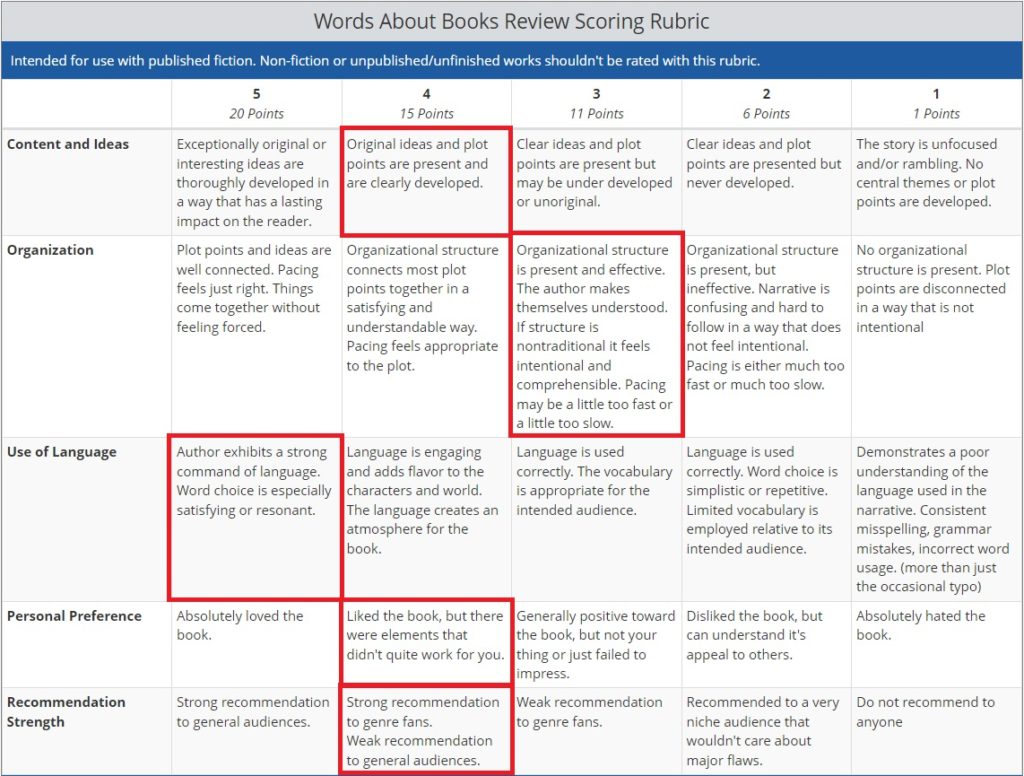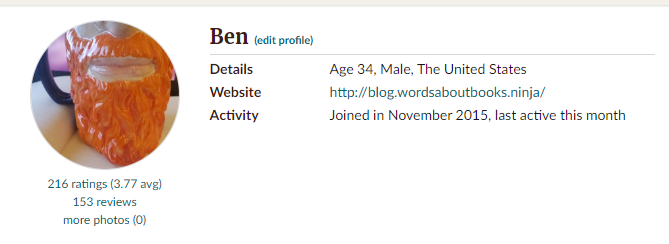Honest Thoughts: The Haunting of Hill House
Recently on the podcast we covered Shirley Jackson’s “The Haunting of Hill House.” We also covered the Netflix series of the same name that was inspired by (not an adaptation of) the book. I wanted to talk a little more about my feelings on the book for a few reasons.
The first reason is that the podcast is lighter in tone and the fun sometimes gets in the way of deeper conversation. The second is that while I am generally positive towards the book, Nate is generally negative towards the book. When we have differing thoughts on the merits and quality of a novel I usually leave the conversation having said only half of what I would have liked to say. I’m sure he feels the same way. The third and final reason is that it has been a little while since we broke out the old Words About Books grading rubric and at least one listener has expressed a desire to know my rating.
I think the best way to tackle this is to show you how I “graded” Hill House and then walk you through my reasoning.

Based on this rubric, I scored The Haunting of Hill House a 76 out of 100. I rounded this up to 4 out of 5 stars on Goodreads. For comparison, at the time of my writing, Nate has given the book a 2 out of 5. Which he lowered from 3 out of 5 after he finished editing the episodes.
Content and Ideas
I gave The Haunting of Hill House a 4 in this category. We can see from the rubric, this means that I think it had original ideas and plot points that were clearly developed. The novel has original ideas in abundance. The core idea is clearly developed, but there are several other topics that the book introduces and never fully deals with.
Without rehashing the entire summary, The Haunting of Hill House is, at its core, the story of Eleanor’s psychological collapse. This is so much a character study of Eleanor that many readers leave the story wondering if the house was even haunted to begin with, or if everything is imagined by its occupants. On one hand, I believe that Jackson intended for the house to be genuinely haunted. On the other hand, I don’t believe it matters.
The central theme, and the entire point, of the book is Eleanor’s confrontation with herself. The events at Hill House force Eleanor to reckon with the disparity between the person who she believes herself to be and the person who she actually is. Eleanor has spent the better part of her youth as a reluctant care giver to an unappreciative mother. She see’s herself as something of a martyr. Her experience in the house reveals that she is more than capable of selfishness. Her every thought is about herself. How others perceive her. What others want from her. What she wants from them.
In the end Eleanor is driven insane. The House aggravates her worst tendencies. She becomes angry and paranoid, then manic and suicidal. In the end, The House wins. Eleanor takes her own life, and in doing so remains there forever. She never masters the aspects of her mind that held her back. She never lives her happy life or drinks from her cup of stars.
This is a good story. For many readers, myself included, I imagine that it hits uncomfortably close to home. The horror of Hill House isn’t the ghosts. The horror of Hill House is the baggage that we bring into it. I feel that this idea and its successful execution are worthy of that 4 on our rubric. But not quite a 5.
What prevents The Haunting of Hill House from getting a perfect score in this category is the amount of underdeveloped material present in the book. Hill House is a short novel. So short that it is barely a novel at all. There is so much left over that it feels unfinished. All of the other characters also have complicated selves to confront. Theodora runs from intimacy and true friendship. Luke is living an extended adolescence, refusing to take responsibility for himself. Doctor Montague is in a loveless marriage with a wife who is implied to be openly cheating on him.
Eleanor isn’t interested in Theodora’s roommate, or Luke’s chronic unemployment, or Doctor Montague’s marital woes. Maybe she should be. Maybe we should want her to be because we are. Maybe the intention is for us to grow as frustrated with Eleanor as Eleanor is with herself and everyone around her. If that is the case, then that too is underdeveloped. I have agonized privately about this point. While I want to believe that Shirley Jackson is so brilliant that all of the clever unexplored mysteries are symbolic of the world we all fail to explore adequately in our obsession with ourselves, I think that may be me reading a meaning into the text that just isn’t there.
Organization
Our rubric lumps quite a bit into organization. Much of it isn’t relevant for more straight forward novels. The main area that is relevant to The Haunting of Hill House is pacing. I’ve said before on the podcast that I think written horror tends to be most effective when it takes the form of a short story. As a rule, the more you understand something the less it will frighten you. As a frequent haver of panic attacks, I can also say that the human body’s ability to sustain a fight-or-flight response is, mercifully, finite. In combination, these two facts make it difficult for stories to scare us over an extended and detailed telling.
Short horror stories get in and get out before your brain has time to go into problem solving mode. A scary monster may terrify you, but given enough time to study it, you may learn its habits and weaknesses. It’s very important not to over-tell a scary story.
With this in mind, the reader might think that the relatively short length of The Haunting of Hill House would be an advantage. I’m guessing that was what Shirley Jackson thought when she decided not to go too deep into the mystery of why Hugh Crane built this house in this way in the first place. Unfortunately, the book exists in kind of a reverse Goldilocks Zone. It is both too long to cover only Eleanor’s perspective and too short to cover the other characters’. Reducing some of the slower portions of the book and making it a novella or novelette would have improved the story. Expanding the scope of the tale to encompass more of the other characters’ lives would have also improved the story.
Use of Language
I joked in the episode about the way people speak with an entirely unrealistic wit and eloquence. I was not lying.
“I am by profession an artist’s model,” Eleanor said quickly, to silence her own thoughts. “I live a mad, abandoned life, draped in a shawl and going from garret to garret.”
“Are you heartless and wanton?” Luke asked. “Or are you one of the fragile creatures who will fall in love with a lord’s son and pine away?”
“Losing all your beauty and coughing a good deal?” Theodora added.
“I rather think I have a heart of gold,” Eleanor said reflectively. “At any rate, my affairs are the talk of the cafés.” Dear me, she thought. Dear me.
“Alas,” Theodora said, “I am a lord’s daughter. Ordinarily I go clad in silk and lace and cloth of gold, but I have borrowed my maid’s finery to appear among you. I may of course become so enamored of the common life that I will never go back, and the poor girl will have to get herself new clothes. And you, Doctor Montague?”
He smiled in the firelight. “A pilgrim. A wanderer.”
“Truly a congenial little group,” Luke said approvingly. “Destined to be inseparable friends, in fact. A courtesan, a pilgrim, a princess, and a bullfighter. Hill House has surely never seen our like.”
Jackson, Shirley. The Haunting of Hill House (Penguin Classics) (pp. 37-38). Penguin Publishing Group. Kindle Edition.
Even though it is unrealistic, I have to admit that it is very appealing to my ear. People don’t talk like this, but I wish that they did. It’s not just the dialogue that Jackson has a way with. The entire book is written in flowing literary prose. The prose is likely the biggest reason for the story’s acceptance in academia.
No live organism can continue for long to exist sanely under conditions of absolute reality; even larks and katydids are supposed, by some, to dream. Hill House, not sane, stood by itself against its hills, holding darkness within; it had stood so for eighty years and might stand for eighty more. Within, walls continued upright, bricks met neatly, floors were firm, and doors were sensibly shut; silence lay steadily against the wood and stone of Hill House, and whatever walked there, walked alone.
Jackson, Shirley. The Haunting of Hill House (Penguin Classics) (p. 1). Penguin Publishing Group. Kindle Edition.
Personal Preference
I like good writing. I like ghost stories. I like a long boring reflection on woman versus herself. I don’t have much to say about my personal preference. The element that didn’t work for me, that kept this from being a five, is my desire for more. I wanted to know more about the house, more about the other characters. Wanting more is about the best complaint you can have about a book, though.
Recommendation Strength
Our rubric defines a “4” in this category as: strong recommendation to genre fans and weak recommendation to general audiences. In the case of The Haunting of Hill House I would like to flip this. I would recommend this strongly to general audiences and weakly to genre fans. Horror is a big tent and I do not want to get caught up in a classification argument about what is and is not “real” horror. With that said, I think that many people who consider themselves to be hardcore horror fans would find themselves underwhelmed at what this book offers them. It is light on scares and disturbing material, but heavy on food for thought.
Conclusion
It is never my intention to mislead people as to a book’s quality during our discussions on the podcast. I was told that people my find it surprising, based on the episode, to know that I thought so highly of this book.

I hope that this concisely explains my feelings toward the book; both the good and the bad. When it comes to books that are widely well-regarded, there is a tendency to focus on negatives as that is where I feel I have the most new to add. I do sometimes forget that not everyone is as steeped in book reviews as I am. I will make an effort in future episodes of the podcast to be clear about what I liked as well as what I disliked.